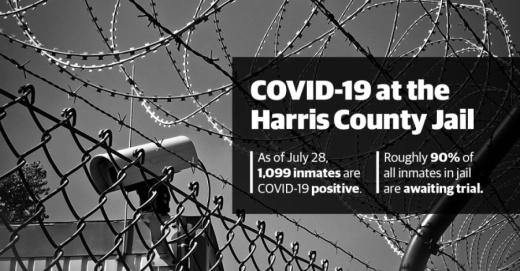The cluster of positive cases that have been confirmed in the jail represent the fourth largest in the U.S., according to officials with the Justice Management Institute, a Virginia-based criminal justice research group that has worked with the county for the past five years to help guide criminal justice reform.
JMI first presented its report to commissioners in early June, warning commissioners at the time that the jail was on the brink of collapse.
"The jail population is growing by more than 115 individuals per week because the number of people coming into the facility is outpacing the number of people released," JMI President Elaine Borakove wrote in a June 1 letter to commissioners. "The accelerated jail population is clearly an indication that your criminal justice system is quickly faltering."
Since then, there has been some positive movement in that district county judges have access to courtrooms again. However, the backlog of felony cases is still growing, she said, estimating around 41,000 cases awaiting trial, up from around 36,000 in June. Meanwhile, jury trials will continue to be suspended through at least September under an order by the Texas Supreme Court.
"Dispositions are starting to rise, but that won’t significantly impact the backlog in short term without changes," Borakove said at a July 28 meeting of the Harris County Commissioners Court. "We can’t wait until September and hope the courts open up for jury trial. We have to get people interacting with the docket now."
There were 8,042 inmates in the jail as of July 28, and 1,099 active cases of COVID-19 were confirmed at that time, said Ericka Brown, who was brought on board by the sheriff's office to monitor the spread of the virus at the jail. The jail is capable of holding between 10,000-11,000 inmates under normal circumstances. Around 6,000 total tests have been given, and about 1,500 inmates in total have tested positive.
Brown said the jail has enough space to meeting current quarantine needs.
"Given space constraints, we are able to quarantine all positive [cases] in isolation or in the infirmary for those who are symptomatic," she said at the July 28 meeting.
Criminal justice advocates said they are worried about what would happen if the outbreak grows. An initial recommendation from JMI in June—for the county to temporarily release certain inmates in jail pretrial for nonviolent felonies—was taken back to the drawing board after issues about its feasibility were raised by some stakeholders. After meeting with the district attorney, district court judges, county officials and some attorneys from the private bar, the institute came back with a few updated recommendations, including using technology more to advance court appearances.
Other recommendations included the implementation of docket reviews and individual case reviews to determine which cases can be diverted, dismissed or plead, and the expansion of diversions and remediation on low level nonviolent felonies. Both recommendations would prioritize cases that are more than nine months old, which Borakove said would allow the county to dedicate more time to newer cases that involve violent crime.
The crisis over the jail's capacity is taking place several months after Harris County Judge Lina Hidalgo issued an executive order to allow the sheriff to temporarily release some nonviolent inmates from the jail during the pandemic. That order was blocked by a Harris County administrative judge.
At the July 28 meeting, Hidalgo maintained that her order could have helped alleviate the current crisis. She said the district court judges themselves still have the ability to release detainees who are awaiting trial at their discretion with those cases being adjudicated at a later time.
Gavin Yamey, a Duke University professor who has studied the virus' effect on prison populations nationwide, agreed with the recommendations from JMI to release certain pretrial inmates.
"We have to take the valve off. It’s a pressure cooker," he said at the July 28 meeting. "That makes us all safer."
Despite disagreements on how to address the issue, Borakove told commissioners that all stakeholders were in agreement that the current volume of cases is troublesome. JMI officials said they will continue to meet with stakeholders moving forward. No action was taken on the item at the July 28 meeting.





